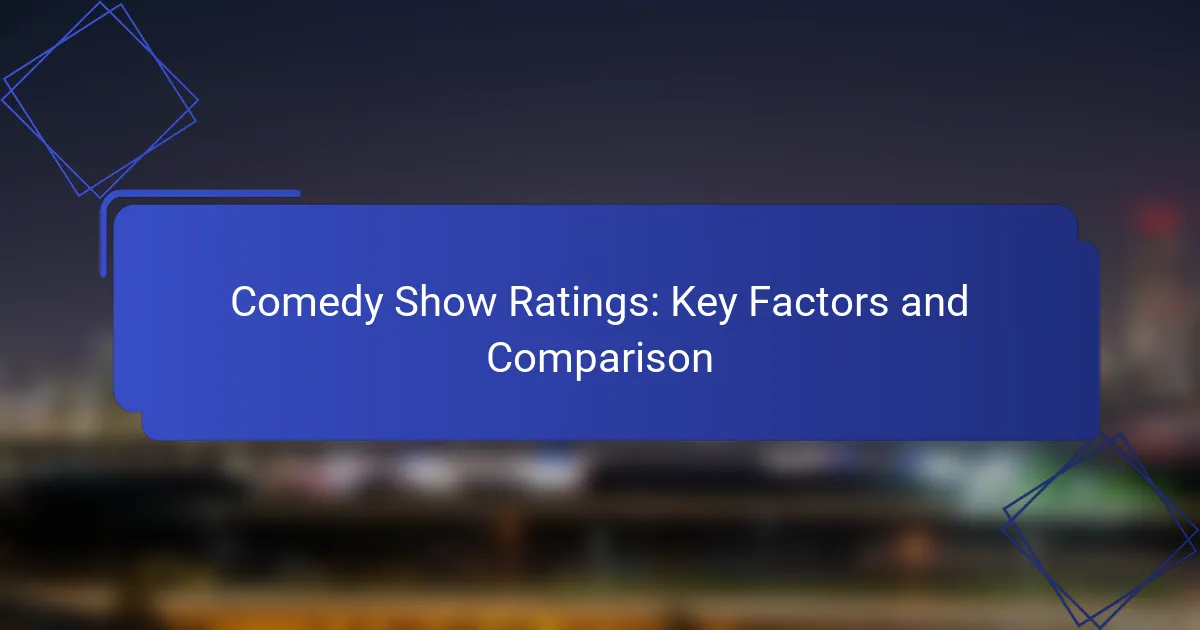Comedy show reviews are shaped by specific selection criteria that highlight the importance of content quality, performance style, and audience engagement. These factors not only influence critics’ assessments but also significantly impact the overall experience for viewers, as demographics and preferences play a crucial role in shaping perceptions and enjoyment of the performances.

How do selection criteria affect comedy show reviews?
Selection criteria play a crucial role in shaping comedy show reviews by influencing the aspects that critics and audiences prioritize. Factors such as content quality, performance style, and audience engagement determine how a show is perceived and rated.
Content quality
Content quality refers to the originality, relevance, and humor of the material presented in a comedy show. High-quality content often features clever writing, relatable themes, and well-timed punchlines that resonate with the audience. Critics typically look for shows that balance humor with thoughtful commentary or social critique.
When evaluating content quality, consider the diversity of jokes and the depth of the material. A show that relies heavily on clichés or offensive stereotypes may receive lower ratings. Aim for a mix of observational humor, storytelling, and topical references to appeal to a broader audience.
Performance style
Performance style encompasses the comedian’s delivery, stage presence, and interaction with the audience. A strong performance style can elevate mediocre material, making it more engaging and memorable. Comedians who exhibit confidence, charisma, and authenticity tend to leave a lasting impression.
Different performance styles can cater to various audience preferences. For instance, some may prefer a more animated, physical approach, while others might appreciate a deadpan delivery. Reviewers often note how well a comedian’s style complements their material, so it’s essential to find a balance that works for you.
Audience engagement
Audience engagement measures how well a comedian connects with their viewers during a performance. Engaging shows often involve the audience through call-and-response, improvisation, or relatable anecdotes. A comedian who can read the room and adjust their performance accordingly typically receives higher praise.
To enhance audience engagement, consider incorporating interactive elements or addressing current events that resonate with your viewers. Avoid alienating jokes that may not land well with the crowd. Successful comedians often build rapport with their audience, creating a shared experience that enhances the overall enjoyment of the show.

What are the key factors in selecting a comedy show?
Key factors in selecting a comedy show include genre classification, venue reputation, and ticket pricing. These elements significantly influence the overall experience and enjoyment of the performance.
Genre classification
Comedy shows can be categorized into various genres such as stand-up, improv, sketch, and musical comedy. Understanding the genre helps audiences align their preferences with the type of humor presented.
For instance, stand-up comedy often features solo performers sharing personal anecdotes, while improv relies on audience interaction and spontaneous humor. Knowing the genre can guide viewers in choosing a show that resonates with their taste.
Venue reputation
The reputation of the venue plays a crucial role in the selection process. Established venues often attract higher-quality acts and provide a better overall experience, including sound quality and seating comfort.
Researching reviews and ratings from previous attendees can offer insights into the venue’s atmosphere and service. A well-regarded venue may enhance the enjoyment of the comedy show significantly.
Ticket pricing
Ticket pricing varies widely based on factors like the show’s popularity, the comedian’s fame, and the venue’s location. Prices can range from affordable options in smaller venues to premium rates for big-name performers in larger theaters.
When selecting a comedy show, consider your budget and look for deals or discounts, especially for weekday performances or early bookings. Balancing cost with the quality of the show is essential for a satisfying experience.

How do audience demographics influence comedy show reviews?
Audience demographics significantly shape comedy show reviews by affecting preferences, interpretations, and overall enjoyment. Factors such as age, cultural background, and social media engagement play crucial roles in how different groups perceive and critique comedic performances.
Age group preferences
Different age groups often have distinct preferences for humor styles, which can influence their reviews. For instance, younger audiences may favor edgy, contemporary comedy, while older viewers might appreciate classic, situational humor. Understanding these preferences can help comedians tailor their performances and marketing strategies.
When reviewing a comedy show, consider the predominant age group in attendance. A show that resonates with a younger crowd may receive higher ratings from that demographic, while older attendees might rate it lower if the humor does not align with their tastes.
Cultural background
Cultural background profoundly impacts humor perception, as what is funny in one culture may not translate well to another. Comedians who draw on cultural references may connect better with audiences sharing similar backgrounds, leading to more favorable reviews. Conversely, humor that relies on specific cultural contexts may alienate others.
When evaluating a comedy show, consider the cultural diversity of the audience. A show that incorporates universal themes may appeal to a broader audience, while niche humor might receive mixed reviews depending on the cultural composition of the attendees.
Social media impact
Social media has transformed how audiences engage with comedy shows and share their opinions. Platforms like Twitter and Instagram allow viewers to post immediate reactions, which can influence the overall perception of a show. Positive or negative feedback can quickly spread, impacting future attendance and reviews.
Comedians and producers should monitor social media trends and audience feedback to gauge reception. Engaging with fans online can enhance a comedian’s reputation and lead to better reviews, while ignoring social media sentiment may result in missed opportunities for improvement and audience connection.

What are the most popular comedy shows in major cities?
The most popular comedy shows in major cities often feature a mix of established comedians and emerging talent, attracting diverse audiences. Venues like the Comedy Cellar in New York City, The Laugh Factory in Los Angeles, and Second City in Chicago are renowned for their unique atmospheres and high-quality performances.
New York City: Comedy Cellar
The Comedy Cellar is a legendary venue known for its intimate setting and surprise guest appearances from top comedians. Located in Greenwich Village, it typically features multiple shows each night, showcasing a blend of stand-up and improv.
Tickets usually range from $15 to $25, and it’s advisable to arrive early to secure good seating. The venue has a strict no-cellphone policy to maintain the performance’s integrity, enhancing the audience’s experience.
Los Angeles: The Laugh Factory
The Laugh Factory is a staple of the Los Angeles comedy scene, famous for its vibrant atmosphere and star-studded lineups. This venue hosts shows almost every night, featuring both established comedians and up-and-coming talent.
Ticket prices generally fall between $20 and $40, depending on the night and the performers. Guests should check the calendar for special events, as celebrity drop-ins are common and can significantly elevate the experience.
Chicago: Second City
Second City is renowned for its improv and sketch comedy, making it a cornerstone of Chicago’s entertainment landscape. The theater offers a variety of shows, including classic revues and original productions, often highlighting social commentary through humor.
Tickets range from $25 to $60, with options for dinner packages available. Attendees should consider booking in advance, as popular shows often sell out quickly, especially during tourist seasons.

How do comedy show reviews impact audience attendance?
Comedy show reviews significantly influence audience attendance by shaping perceptions and expectations. Positive reviews can attract larger crowds, while negative feedback may deter potential attendees.
Influence of online ratings
Online ratings play a crucial role in determining audience turnout for comedy shows. Many potential attendees check platforms like Yelp, Google Reviews, or specialized entertainment sites before making a decision. A show with a rating above 4 stars often sees higher attendance compared to those with lower scores.
Moreover, the volume of reviews can also impact attendance. A show with hundreds of positive reviews may appear more trustworthy than one with only a handful, even if the ratings are similar. This phenomenon highlights the importance of accumulating positive feedback over time.
Role of social media buzz
Social media buzz can dramatically affect audience attendance at comedy shows. Platforms like Twitter, Instagram, and Facebook allow fans to share their experiences and opinions, creating a ripple effect that can attract more attendees. A viral post or a trending hashtag related to a show can lead to increased interest and ticket sales.
Engagement with influencers or comedians who actively promote their shows on social media can also enhance visibility. For instance, a comedian with a large following sharing behind-the-scenes content or funny clips can generate excitement and encourage their fans to attend. Leveraging social media effectively can be a game-changer for boosting attendance.

What emerging trends are shaping comedy show reviews?
Emerging trends in comedy show reviews are increasingly influenced by social media, audience engagement, and the rise of streaming platforms. These factors shape how performances are critiqued and perceived, reflecting a shift towards more interactive and immediate feedback mechanisms.
Social Media Influence
Social media platforms play a significant role in shaping comedy show reviews by allowing audiences to share their opinions in real-time. This immediate feedback can amplify a show’s popularity or highlight its shortcomings, often before traditional reviews are published. Comedians and producers are now more attuned to audience reactions on platforms like Twitter and Instagram, which can influence future performances.
For example, a viral clip from a stand-up routine can lead to a surge in ticket sales, while negative comments can deter potential viewers. Comedians often adapt their material based on social media feedback, making it a crucial element in the review process.
Audience Engagement
Audience engagement has become a key factor in comedy show reviews, with many reviewers considering how well a comedian connects with their audience. Interactive elements, such as Q&A sessions or live polls during performances, enhance viewer participation and can lead to more favorable reviews. Reviewers are now looking for shows that create a sense of community and involvement.
Shows that encourage audience interaction often receive higher ratings, as they create memorable experiences. Comedians who effectively engage their audience can build a loyal fan base, leading to positive word-of-mouth and increased attendance.
Streaming Platforms
The rise of streaming platforms has transformed how comedy shows are produced and reviewed. With more comedians releasing specials on platforms like Netflix or Amazon Prime, reviewers are now evaluating not just live performances but also the production quality and accessibility of these shows. This shift has broadened the scope of comedy reviews to include aspects like editing, cinematography, and overall presentation.
As streaming continues to dominate, reviewers may focus on how well a show translates to a digital format, considering factors such as pacing and audience retention. Comedians are increasingly tailoring their performances for these platforms, which influences both the content and the critical reception of their work.



